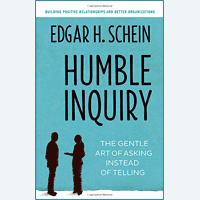You pick up some books because of the author and some because of the title. This one called to me for both reasons. Through Edgar Schein’s foundational work, Organizational Culture and Leadership, 4th ed. (Jossey-Bass, 2010), I learned what it means to look at a congregation through its artifacts, espoused values, and goes-without-saying assumptions. Schein prepares leaders to read corporate cultures for the sake of bringing about lasting change, even change in cultures of advanced middle age.
Relating is crucial to the task at hand. Asking the right questions taps into a necessary wisdom of those on the frontline.
This teacher caught my attention with Humble Inquiry: The Gentle Art of Asking Instead of Telling because he was offering a best practice — asking instead of telling — as an alternative to behavior that has bothered me for some time. That is, the consultants and gurus who come to a gathering of church leaders and tell them what they need to go home and do. At best these experts speak from the limited paradigm of a solitary success story, and at worst they show a complete lack of interest in the local culture and context of their clients.
Schein offers the better way of humble inquiry, which he defines as “… the fine art of drawing someone out, of asking questions to which you do not already know the answer, of building a relationship based on curiosity and interest in the other person.” This is not a plea for good manners in the work place; it is an argument that leaders and followers need to come to terms with three contemporary developments: the complexity of  relevant data, the interdependence of the workplace, and emerging cultural diversity of the persons in it.
relevant data, the interdependence of the workplace, and emerging cultural diversity of the persons in it.
Schein illustrates the risks of ignoring these developments with case studies in surgical teams, airline crews, and nuclear power plant administrators. But they are the dramatic instances of an everyday reality. We cannot each alone master the information available for an informed decision today. Hiding behind rank or reputation as an authority cuts us off from saving information. Relating is crucial to the task at hand. Asking the right questions taps into a necessary wisdom of those on the frontline.
I think many persons like me who go around telling other people how to unlock congregational vitality are ready to learn to pass batons in the relay race or cooperate on the seesaw, Schein’s favorite metaphors for humble inquiry. But I would hope his message might reach the persons in the pews and inspire them off the bleachers and out onto the field of reversing mainline decline. We are in this thing together.
Humble Inquiry: The Gentle Art of Asking Instead of Telling (Berrett-Koehler, 2013) is available through Amazon.
Related Resources:
- Right Questions for Church Leaders
- Listening: A Key Team Building Skill by Robert C. Crosby
- The Transformative Power of Listening by Mary Clark Moschella







